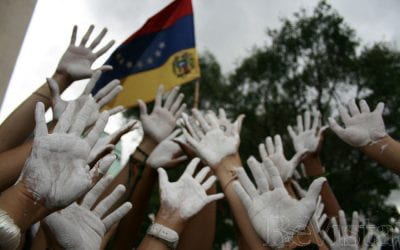Nossa and Nuestra América: Inter-American Dialogues
Is Brazil Part of Latin America?

Nossa and Nuestra América: Inter-American Dialogues By Robert Newcomb Purdue University Press, 2012, 264 pages
Robert Newcomb’s Nossa and Nuestra América: Inter-American Dialogues is a must-read study on Latin American social thought that deals with the tense and productive relationship between Spanish America and Brazil. The book made me realize how the underlying forces structuring this dialogue—so well described by Newcomb—are still very active in the interactions between Brazilianists and Hispanists within the intellectual field of Latin American Studies in the United States.
According to Newcomb, the relationship between Spanish America and Brazil could be defined “on one side by Spanish American identity projection” and “on the other by Brazilian affirmation of national singularity.” Whereas Spanish American intellectuals such as José Enrique Rodó (1871-1917) and Alfonso Reyes (1889-1959) highlighted the commonalities of Brazil and Spanish America as part of an Iberoamérica, Brazilian letrados such as Joaquim Nabuco (1849-1910) and Sérgio Buarque (1902-1982) emphasized the specificities of Brazil vis-à-vis Hispanic America. It is fascinating to realize how the dialogue between these two cultural traditions is fraught with contradictions, misunderstandings and misconceptions borne by both sides.
A few examples: Rodó clearly understands the Latin American part of the continent as a cultural unity (as opposed to a political one) encompassing Brazil as part of that unity. His knowledge of Brazil, nonetheless, is quite limited. Newcomb notes that in Rodó’s Obras completas there is no reference to any Brazilian writer, which is good evidence of Rodó’s ignorance about Brazil. How could Rodó claim such cultural unity if he barely knew Brazilian literature and culture? The same question could be asked of Alfonso Reyes, the prominent Mexican Ambassador who spent many years promoting the cultural exchange between Brazil and Mexico (and Spanish America, as the good arielista he was). Reyes believed that Spanish and Portuguese were languages that could benefit from exchange and “cross-fertilization,” and always added some words in Portuguese in his articles as a way to refresh his prose. According to Reyes, the Spanish speaker and the Portuguese speaker could always understand each other, and this possibility of mutual understanding was interpreted as a sign of vitality of Latin America culture.
There were, however, some fissures in the discourse of mutual understanding. In private letters, Reyes complained about his intellectual isolation due the language barrier. According to Newcomb, Reyes “described Portuguese—and his inability to speak it—as contributing to both his sense of loneliness and Brazil’s apparent intellectual isolation.” If Spanish and Portuguese were languages so indistinct from each other, as Reyes would like us to think, why did he feel such malaise about the gap between them? Why, in Reyes’ view, was Brazil so isolated?
Newcomb answers theses questions by means of the essayistic oeuvre of two major Brazilian intellectuals: Joaquim Nabuco and Sérgio Buarque. Both of them were monarchists who believed in the superiority of Brazilian institutions (because of the monarchy) vis-à-vis their South American peers. When Brazil became a Republic in 1889, Nabuco feared the “South Americanization” of Brazil. He believed that the Brazilian political system was more mature than that of any other country in South America—a world plagued by political upheavals. If for Nabuco and Buarque the political institutions of Brazil did not resemble the Hispanic American ones, the cultural differences were even greater. Nabuco and Buarque identified more cultural affinities and similarities between Brazil and Portugal than Brazil and Spanish America.
In his most important essay, Raízes do Brasil, Buarque compares Spanish colonization in the Americas with the Portuguese colonial rule (especially the way both colonizers organized urban spaces in the Americas). Buarque uses the Spanish colonization as a counterpoint to underline the specificity and singularity of the Portuguese colonization in Brazil. As I mentioned earlier, one of the great merits of Nossa and Nuestra América: Inter-American Dialogues is to examine a remarkable and persisting pattern in Latin American intellectual life. Brazilian literary scholars are still trained in Brazil to compare their culture with Mother Europe, and, most of the time, they neglect their neighbors. Brazilian literature and culture are studied and taught in a very self-referential way at Brazilian universities. Thus a Brazilianist from Brazil who decides to teach and do research in the United States may find it somewhat strange that here it is taken for granted that Brazil is part of Latin America, and that in the U.S. universities Brazilian Studies is subsumed under Latin American Studies. Nossa and Nuestra América sheds light into this intricate and tense relationship.
Fall 2012, Volume XII, Number 1
Alfredo César Melo is an Assistant Professor of Romance Languages and Literatures at the University of Chicago.
Related Articles
University Lessons: Editor’s Letter
I learned about universities on the barricades. Well, not exactly. I was a philosophy student at Barnard—the women’s college at Columbia University—when the uprising began in 1968. Students, including my boyfriend and several classmates, took over buildings to protest…
The Last Word
More than twice as many Latin Americans are attending institutions of higher education than two decades ago, and the number will continue to increase as more students graduate from secondary schools. ReVista’s timely focus on higher education is thought-provoking…
Making a Difference: A Problem With the UN Millennium Goals
Every Saturday for two years, Estevana Sánchez walked through the jungle for miles, in the dark, crossing a river in the rainy season, to finish high school. Her five teenage children did the same. At the end of the trail, they took a long bus ride to the town of San Juan del Sur…




